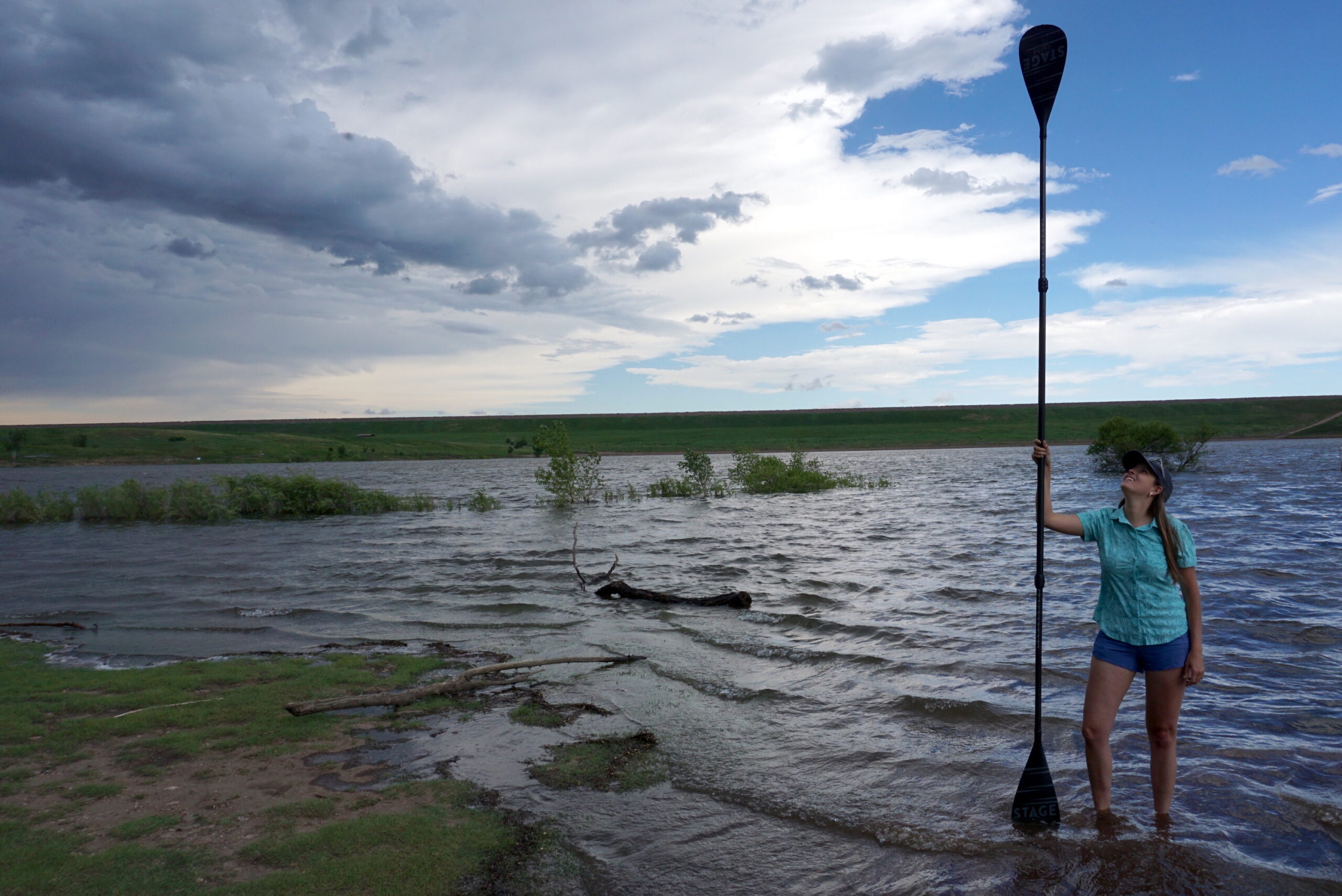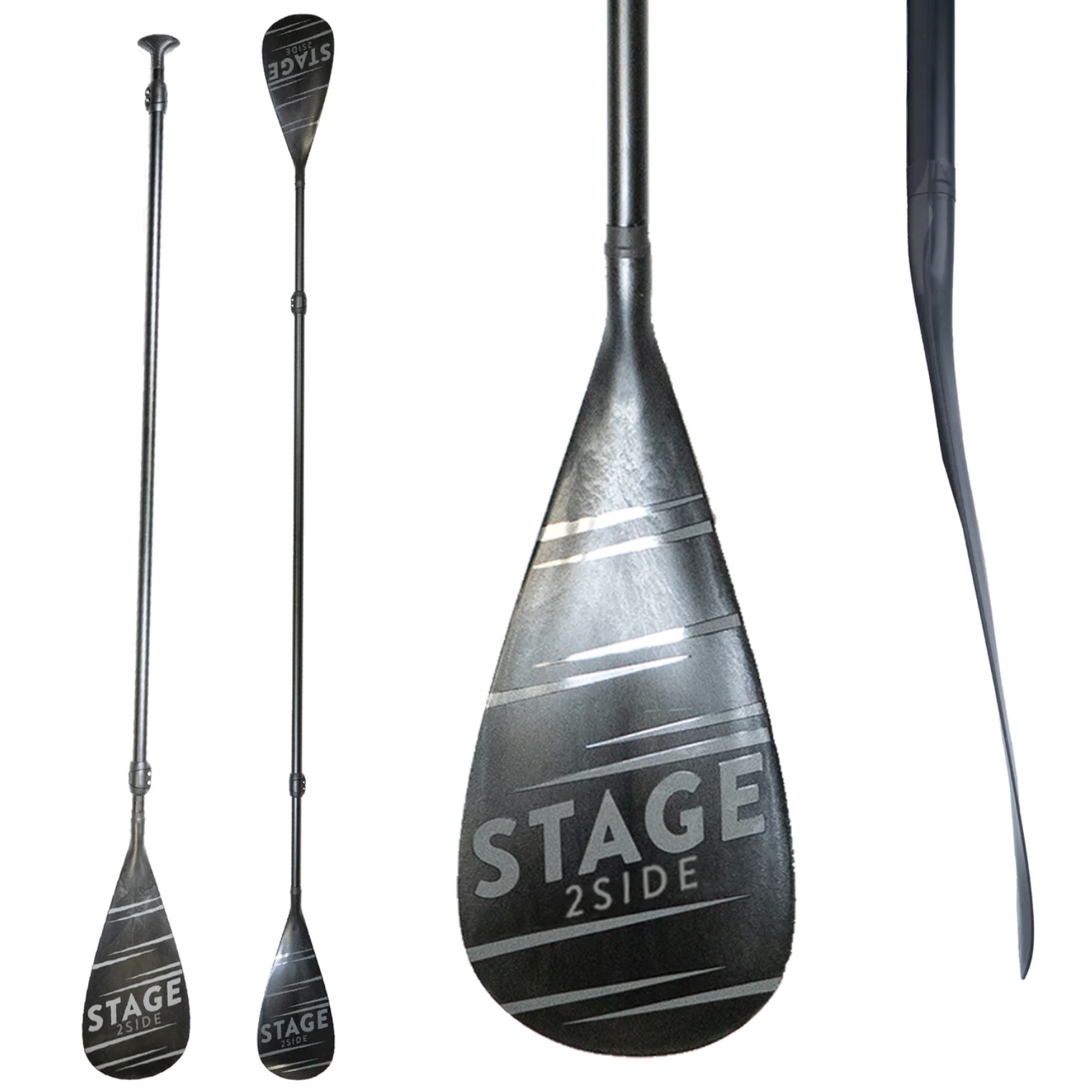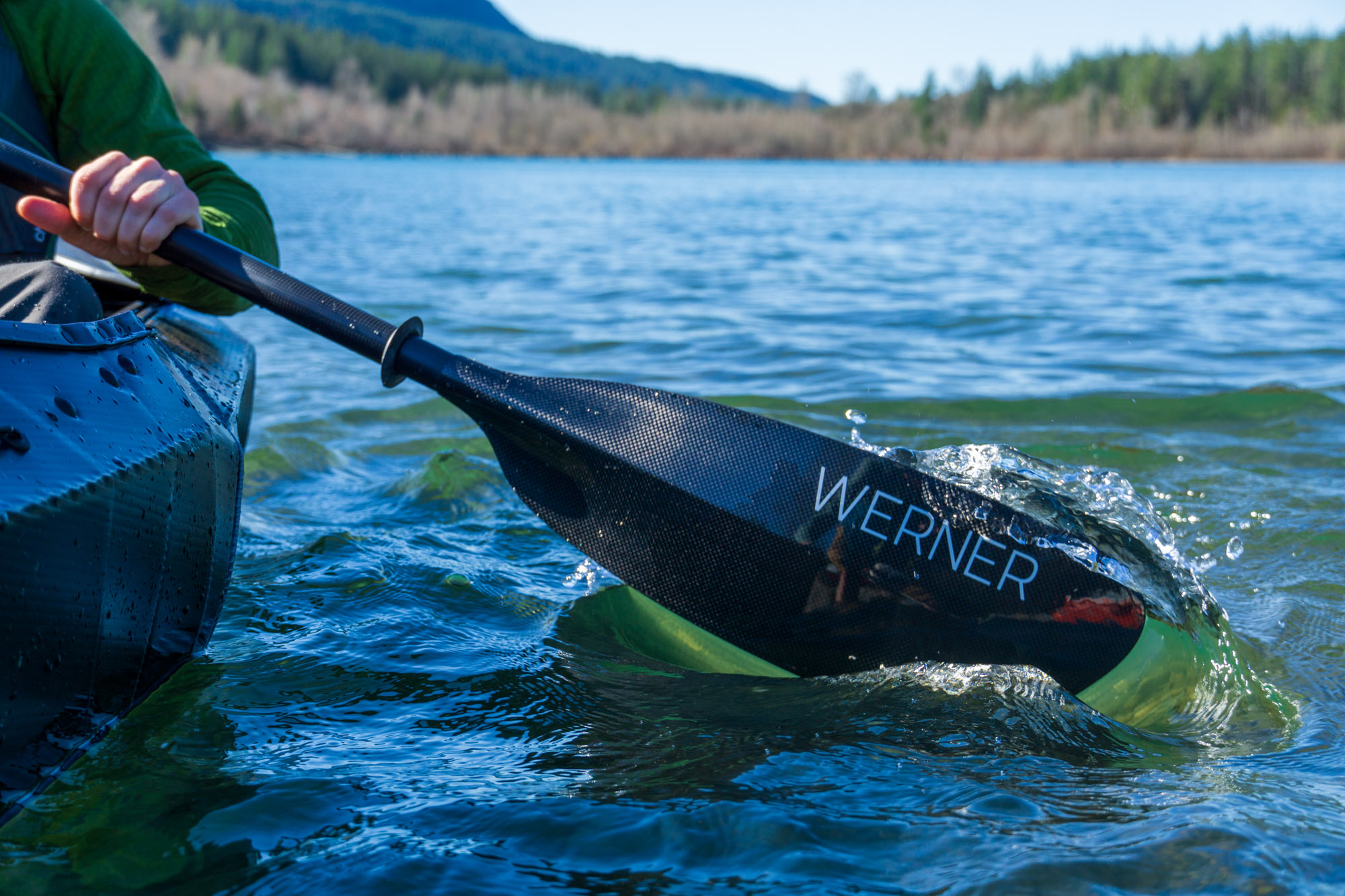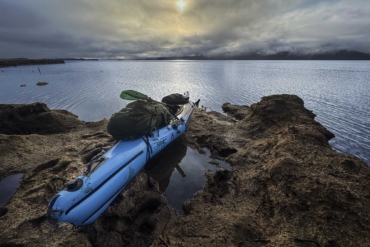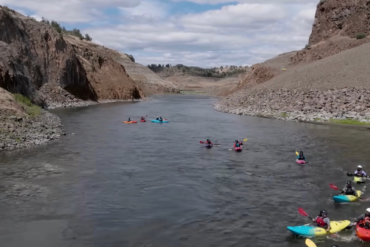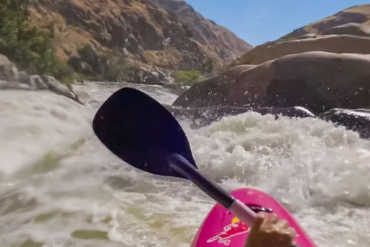Anyone who’s tried paddleboarding knows it can be fun, but sometimes tricky to learn. One of the steeper learning curves (aside from balance) is learning to actually paddle properly. Your stance, which muscle groups you use, and how well you paddle along the length of your board will all factor into your efficiency on a SUP.
The action is more like paddling a canoe than a kayak and requires switching hands with every stroke. Unless you are a SUP racer, it can sometimes feel awkward.
Paddling back and forth on both sides like a kayak is faster, though. And it’s more efficient. A lot of people who get into stand-up paddleboarding enjoy sitting or kneeling, to begin with. So having a double-bladed paddle makes sense. Especially now that there’s so much crossover with SUPs and kayaks. There are even hybrid boards that function as both.
One small brand has come up with a design solution to give standup paddlers more efficiency. The double-sided SUP paddle from STAGE (no, it’s not a kayak paddle!) gives you the option to paddle standing with a one-sided SUP paddle, paddle sitting down with two blades, or fuse the two and paddle standing up, with a SUP-size double-sided paddle.
I got my hands on one of these unique paddles to test it out and see how it compared to standard SUP paddles that are universal on lakes, reservoirs, and rivers.
In short: The STAGE 2SIDE Paddle is a nifty SUP innovation that offers versatility and function in equal parts. It makes paddling easier and more efficient in most cases. And it’s got multiple configurations for different styles of paddling. After testing, however, I’ll likely only use this specific paddle for flatwater SUP adventures. If you are a gear junkie like me and already have a paddle or two, you should still put this STAGE paddle on your list.
STAGE 2SIDE Double-Sided SUP Paddle Review
- Double-sided paddle length: 112" to 156" (300 cm to 396 cm)
- Single paddle length: 75" to 90" (190 cm to 229 cm)
- Double-sided paddle weight: 3 lbs. 12 oz. (1.7 kg)
- Single paddle weight: 2 lbs., 9 oz. (1.2 kg)
- Shaft material: 60% carbon fiber, cam-lock adjustments
- Blade material: Blend of polypropylene and fiberglass
- Center shaft length: 53" (135 cm)
- Shaft diameter: 28.7 mm
- Warranty: 1 year
Pros
- Paddles more efficiently
- No more swapping the paddle between hands every stroke
- Multiple usable configurations
- Flexible and light given its extra length
- Floats if you drop it
Cons
- VERY long (unwieldy sometimes)
- The 60% and 100% options can be too lightweight for some weather conditions

Typically, all SUP paddles consist of three parts: the T-grip or handle, the shaft, and the blade. For the majority of the SUPs sold on the market, the shaft is at least two pieces (sometimes three or four). That makes it easy to break down for storage and travel.
The STAGE 2SIDE is a three-piece paddle — that offers so many configurations! You can use it as a standard-height one-sided paddle in SUP mode. Or use it as an extra-length two-sided paddle in SUP mode or a standard-length two-sided paddle in kayak mode. Really, no matter how you choose to paddle on a SUP or kayak — sit, kneel, or stand — this paddle can accommodate and seamlessly change between modes.
Now, I’m a paddle nerd. So I already own three or four paddles (a compact travel paddle, a few different paddles for SUP, an asymmetrical dihedral paddle for whitewater, a full carbon paddle, etc.). But the general user should never need that many.
Get one that can do everything — or at least, one that can do most everything. And the STAGE 2SIDE Paddle fits the bill.
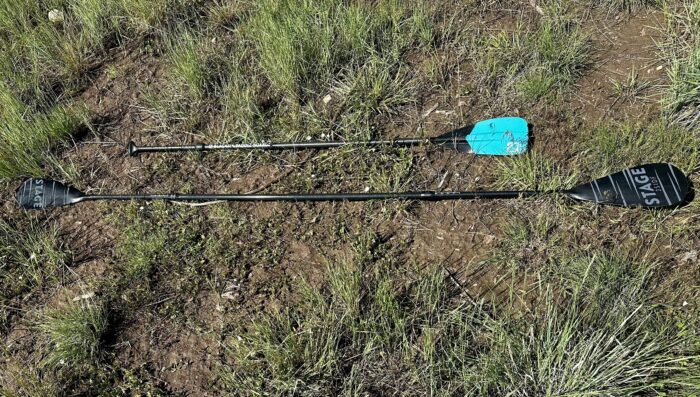
Testing the STAGE 2SIDE Paddle
My first test with this paddle was in some tricky weather. For leisure paddling, that’s a bummer, but for gear testing it was great. I paddled about a quarter-mile from shore out and back a few times, in about 20mph crosswinds. Even closer to shore, the waves on Chatfield Reservoir had picked up. After about 10 minutes, I dropped from my race stance to sitting, quickly swapping out my T-grip for the second paddle blade.
So far, the dual usage of the paddle was working beautifully.
Standard SUP paddles — the ones that will come with your board — will typically range from 72 to 86 inches in max height. The STAGE 2SIDE paddle is a great alternative, measuring 75-90 inches, which is on par with if not better than other SUP paddles on the market.
Now onto the double-sided mode. Standard kayak paddles are meant for use while sitting. Still, many of them are adjustable depending on the user’s height. Checking my gear closet, I see a few paddles that range from 85 to 90 inches for kayaking.
Here’s the unique part about the STAGE 2SIDE that some people get hung up on: the SUP paddle for standing kayaking mode is nearly double that. Why? Simple, you are standing up. The center of the shaft is higher from the water, meaning your paddle is much further away from the water’s surface. In order to successfully paddle on both sides standing, you need a lot more shaft on either side. The result is a paddle that is almost comically long.
Why It’s Great

This double-bladed SUP paddle has a few other really awesome applications. For one, when using a traditional SUP paddle, you constantly have to switch hands and sides. With this double-sided paddle, your hands never have to move around. Meaning, you can get a lot more paddle strokes. That also reduces the chance of dropping your paddle in the water or fumbling to get your paddle in the right position each time.
It also prevents paddlers from having to physically move the paddle across the board in front of them. One major con with a traditional paddle is if you have another person or a dog riding on board, typically they sit in front of you. And when you constantly have to move the single-sided paddle across the board, you could erroneously whack your passenger in the back or face (I can confirm this does happen). No bueno.
Even if you don’t have a passenger, if you’re using the deck area of the board to store gear like dry bags or a cooler, it’s frustrating having to navigate obstacles when switching sides to paddle. The double-bladed 2SIDE solves that issue.

Finally, as I already mentioned, the double-bladed paddle increases (and potentially doubles) efficiency. This gives riders the ability to paddle longer, farther, or maybe feel more confident when facing weather or headwinds. Having the paddle blade constantly in contact with the water also helps balance and stability.
I tested this paddle a ton in both sitting kayak mode, kneeling/transitioning, and of course standing SUP-kayak mode because I wanted to make sure it performed well across the board.
Drawbacks: Lightweight Materials, Flatwater Only

STAGE currently offers three major options for the 2SIDE double-bladed SUP paddle. There’s an aluminum and fiberglass paddle, a 60% carbon paddle, and a 100% carbon paddle with either standard or 100% carbon fiber blades. The blades also vary with a couple of material options: polypropylene and carbon fiber.
You’ll already see a ton of differences between the aluminum shaft paddle with polypropylene (PP) and fiberglass blades, and the 60% carbon version, which I tested. Aluminum and fiberglass paddles are dense and heavy — carbon fiber is a great upgrade if you paddle often. Now, the key decision I had to make was between 60% or 100% carbon.
In the years since STAGE first launched this paddle, it has tailored some updates to the paddle’s construction. The brand calls it the “flex design,” which basically refers to how they purposely constructed the shaft with a little bit of flex, so the paddle moves with you and doesn’t feel excessively stiff.
You don’t want a paddle this long to make your arms feel like lead — you want it to be lighter, supple, and be able to adapt to your movements and slice through wind. Overall, the 2023 60% carbon paddle I tested is designed pretty well and feels light, yet not flimsy in hand.
In my opinion, the 100% carbon would be much too light in any sort of wind and weather. Even with the 60% carbon, a few times in windier weather (25+ mph), it was too much. So, I opted to shorten the length and sit/kayak for better efficiency in getting to shore. Of course, most recreational SUPers are going out in good, mild weather, where the wind speeds aren’t severe. So, it’s a small con but one worth mentioning.
Finally, this paddle excels for flatwater paddling only. In slower-moving rivers, it also did well (the blades are a nice shape and the paddle offers great control overall). But if you are doing a more technical river trip or paddling whitewater, you will likely want to stick with a more performance paddle that isn’t so long in length. It’s also worth noting when using the longer paddle to watch out for fellow paddlers, if you frequent lakes that are crowded or are paddling in a group.
Conclusion

My mind was pretty blown after using this paddle. It’s awesome to have an option that keeps me standing and helps me paddle more efficiently. I used slightly different muscle groups using this paddle, as well. I think anyone who’s out on the water often will get a lot out of the 2SIDE. If you own various boats (SUPs, kayaks, inflatables, etc.) this paddle should work for all of them.
There aren’ many cons. It’s worth noting I wouldn’t opt for the lightest weight material option (it just seems too light). And while it’s best only for flatwater paddling because of its length, size, and range, its versatility and ease of use outweigh this paddle’s limited drawbacks.
The STAGE 2SIDE paddle also has a ton of adjustability built into it. Measuring it out, this paddle can suit paddlers anywhere from 5′ to 6’3″ with the double configuration.
Conclusion? This paddle is for those of us who enjoy stand-up SUPing more than sitting down. If you already love standing up, hey, try stand-up kayaking! And if you never got the hang of standing, you might do better with this double-sided paddle. The true beauty of this paddle is that the option for both is at your fingertips.
